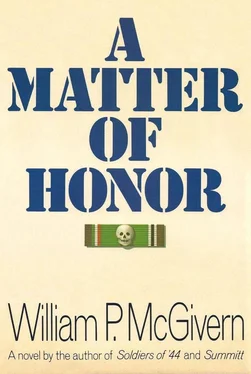That night the colonel and his wife were alone. From the very beginning, Maggie Weir’s sensuality, her pleasure in variations of lovemaking, had been a constant, goading pleasure. In the hotel dining room, over dinner and a fine bottle of Rheinhessen Liebfraumilch and an Eis Wein with dessert, Colonel Weir told her what he wanted.
Later they had showered together, embracing under jetting streams, lathering each other with pine-scented soap, leaving the shower door open till every bathroom mirror was misted over, closing them in a warm, muted world of sexual arousal.
Then Maggie had run naked to the snow-covered balcony outside their bedroom, thrown herself into the cold, white blanket, thrashing her arms and legs into sculpturing angels. Her husband followed. They went through this antic arousal half a dozen times before they Hung themselves into the bed and under quilted eiderdowns and between sips of warming brandy, made love with an intensity as hot and frenzied as the strange images their bodies had left on the snowy balcony.
When Weir woke in the morning to kiss his sleeping wife, her forehead was hot to his lips. By ten o’clock she had tried strong tea and aspirin but there was a glisten of fever in her eyes and two spots of unnaturally high color on her cheekbones. It was then that Colonel Weir called the lobby desk and ordered a cab to drive him and his wife to the local clinic.
Even excellent hospital care and the strength of Maggie Weir’s young body could not fight off the sudden, devastating pneumonia and subsequent lung collapse.
Three days later, when the colonel came back alone to the hotel room to pack their things, he noticed that a light snow had fallen but the deep curves of two bodies were still faintly outlined, almost as if traced in blue shadow, in the snow on the balcony.
The telephone in the study of the old farmhouse rang and the general carried his drink across the veranda and into the front hall. Laura Devers, he thought. She’ll be calling about dinner. Good friend that she was, Mrs. Devers didn’t understand, in fact, disapproved of the general’s need to spend so much time alone.
The phone was still ringing as the general walked into his study. Small logs crackled in the fireplace and the room was lit with light and shadow. The general waited as the phone rang a third and then a fourth time. His own voice sounded from the answering machine after the fourth ring. “This is Tarbert Weir. After the tone signal, would you please leave a message and your phone number. I’ll get back to you as soon as possible...”
The tone signal sounded and then a vaguely familiar voice came from the speaker. “General, this is Bonnie Caidin, an old friend of Mark’s. You may remember me. I’m trying to locate him and have a hunch he may have driven down there.” She seemed to hesitate a moment. “Tell him I’ve got to talk to him. It’s urgent. Something about George Jackson, that soldier. My number is 312-346-7077. And thank you, sir.” The tape clicked off and a message button at the base of the machine lit up red.
“... you may remember me,” Bonnie Caidin said. He’d met her once with Mark, after his son came back from Vietnam and before he began making his campus speeches, a tall girl, all white skin and freckles and soft, shining eyes. And so polite to him, the Army officer, the enemy, and yet the father of the man she was in love with. It had been so obvious to him that he’d felt a sharp pang of envy that hot afternoon. All three had crowded into a booth in the Pump Room, gin and tonics in frosted glasses for the gentlemen and a fresh limeade for little Miss Caidin, who couldn’t have been more than seventeen or eighteen, sitting so close to his son, her hand touching Mark’s broad, brown one on the starched tablecloth. Their eager sensuality and animal warmth was so palpable that General Weir, much sooner than he’d planned, called for the check and said goodbye.
Tarbert Weir had walked with long strides down the three blocks to Michigan Avenue, then zigzagged through rows of heavy traffic to reach the beach walk along Lake Michigan. He positioned himself at the edge of the cement block breakwater, standing close so that the spray of crashing waves cooled his face, soothing his rage and finally admitting, with some generosity, that every man had a right to be loved that way, even his own son.
Little Bonnie Caidin... he had thought that was over a long, long time ago, and, yes, Miss Caidin, I do remember you.
Grimes appeared then, backing his way in against the study door, two logs cradled in his arms. He put one piece of wood on the fire and the other on the hearthstone. He pulled off his gloves and plaid jacket and said, “I thought I heard the phone ringing, general, somebody leave you a message.”
The general switched on the desk lamp. “It rang and somebody did.”
“It could have been for me, you know,” Grimes said. “I still got some old pals and lady friends who like to keep in touch.”
Grimes was short and thickly built, forty-nine, eight years the general’s junior, with a head as round and solid as a bowling ball and a complexion weathered a dark brown in all seasons. His eyes were small and blue and he wore his black hair in a crewcut, the same style that had been popular when he was an enlisted man almost thirty years before, assigned for the first time to the same unit as Lieutenant Tarbert Weir.
“It wasn’t for you, corporal,” Scotty Weir said. “I didn’t answer it, but I listened to the message.” Grimes waited, studying the general’s quiet, thoughtful face.
“Let me fix that drink for you, sir,” Grimes said, “and then you can tell me whatever you feel you want to tell me.” He took the crystal whiskey glass from the desk and went out toward the kitchen.
John Grimes had asked for and received an honorable discharge as a corporal, his rank for fifteen years, the same month as the general left the Army. Grimes’ last commanding officer had offered him sergeant’s stripes in his last month in service, a customary promotion among long-termers to insure additional pension benefits and privileges. But taking his lead from General Weir, Grimes declined it.
When he decided to retire early, Tarbert Weir had refused to accept a token physical disability on his record, a popular practice among officers to increase retirement benefits and other perks.
Weir would have found it repugnant to go along with that deceit, with its implication that he had performed at only twenty-five percent of his maximum efficiency. He had enlisted at seventeen, a rugged, determined farm boy in one hundred percent shape, and he insisted on being separated from the service in the same condition he’d entered it.
From the kitchen he could hear Grimes washing the crystal glass under running water, then cracking ice cubes from a tray. It was typical of the man, Weir knew, to wash and shine the glass before making a fresh drink. But Grimes was not always an automaton, the perfect corporal.
Firelight flickered in three empty, glass-fronted cabinets built flush into the study walls, designed and placed on the house plans by Maggie. In one corner of the study stood an old Army footlocker, brass corners gleaming. It had once been Mark’s toy box, and they had carried it, filled with trains and dump trucks and tattered children’s books, from one post to another. In later years the locker was used to store things Maggie had saved and planned to display as General Weir’s career memorabilia — medals, campaign ribbons, newspaper clippings, foreign decorations, letters of recommendation. If she had lived, they might all be displayed now in the empty cabinets.
Once, some years ago, Weir had asked Grimes to consult a local carpenter about removing the glass doors and widening the shelves to hold books, but the corporal had never got around to it. Nor had he gone through the items in the locker, as requested, to arrange them according to dates and places and actions, so they could at least be put away in a closet or storeroom. The collection was still a jumbled mass of colored ribbon and inscribed metal and folds of yellowing paper piled into an old trunk without lock or key.
Читать дальше












